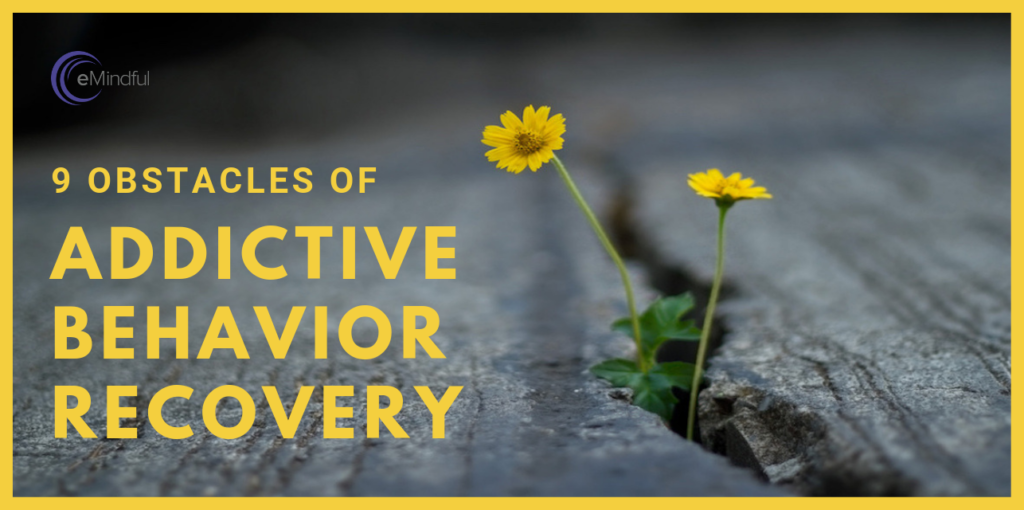
July 12, 2019
9 Addictive Behavior Obstacles Holding you (or a Loved One) Back
When it comes to addictive behaviors, anyone could be suffering from them. Whether it’s an addiction to gambling, shopping, eating or even drugs and alcohol, there are many obstacles to overcome. These obstacles arise out of unhealthy patterns of thinking, behaving, and relating to others. Amplifying the positive and letting go of the negative is the work of recovery.
These nine obstacles of recovery will help you or a loved one identify what’s holding you back in your journey to recovery.
1. Lack of Awareness
The fundamental reason people don’t recover from addiction is a lack of awareness. Lacking self-awareness, thoughts, feelings, and impulses tend to amplify into full-blown craving. More self-awareness, however, empowers people to work with thoughts, feelings, and impulses so they can recover. Mindfulness amplifies self-awareness, which is why it is a powerful skill for overcoming addiction.
2. Primary Defense Mechanisms of Denial, Projection, & Rationalization
People can’t recover from addiction if they deny having a problem in the first place. Additionally, blaming others for one’s coping habits is another dead end.
Lastly, ever more clever reasons that justify one’s addictive behaviors are a smokescreen. Rationalization attempts to hide the problem of addiction but will never solve it. Accepting responsibility for one’s past behavior is one of the first steps in the journey of recovery.

3. Fixed Views
Close mindedness and strongly held false or negative beliefs bind people to a set of scripted behaviors that keep them stuck. A growth mindset, on the other hand, describes an attitude of openness to new ideas as well as a belief in one’s capacity to learn, grow, and change.
4. Low Expectations for Recovery
Similar to a fixed negative mindset, having a low expectation for recovery becomes a self-fulfilling prophecy. Holding such a self-defeating belief reduces the attention paid and effort expended on recovery related endeavors. Since nothing comes from nothing, recovery becomes unachievable, which is precisely the outcome such a negative expectation would predict.
5. Excessive, Irrational or Unconscious Fear
Fear inhibits rational thinking and dims awareness. Learning to mindfully work with thoughts and sensations related to fear helps a person cope by reducing the intensity of the emotion. When people practice mindfulness, they rewire their brain so it produces less fear in the future.
6. Depressed Mood, Isolation & Withdrawal from Normal Activities
These three qualities reinforce and amplify each other creating a downward spiral that’s difficult to reverse. Being depressed IS depressing! It takes effort and persistence to reverse course. But people who see the truth of their predicament and fight like a warrior to reclaim their lives. They start by getting support from wise and kind others. Then, they push themselves to reengage with their life. And they do it even when it’s hard.
7. Reliance on Passive Quick Fixes Rather than Putting Effort into One’s Own Growth & Development
Passive quick fixes are like candy, they satisfy the senses, but they supply little or no nourishment. Individuals that break the chains of addiction commit to learning, self-development and self-awareness. The journey of recovery is harder and takes longer than anyone would prefer, but the nourishment that the recovered addict receives from the effort exceeds all expectations.

8. Negative Attitude Towards Healthful Activities & Participation
You can’t win if you don’t play. Recovery requires participation and bootstrapping yourself into a positive frame of mind even when it’s hard. individuals have to learn to become their own best therapist and cheerleader.
9. Unhealthy Relationships, Characterized by Selfishness or Lack of Kindness
Humans are social creatures. Every potential benefit on the road to recovery will depend on a web of cooperative, supportive, relationships. Not knowing how to cultivate and maintain healthy relationships is a primary reason people fail to recover. Since it’s hard to heal alone, those who succeed in recovery usually dedicate themselves to reciprocally giving and receiving care within a group or community.
Learn More about How to Mindfully Overcome Addictive Behavior Today
eMindful’s newest live, interactive 10-week course, Mindfully Overcoming Addictive Behaviors, is specially designed for individuals navigating the various stages of addictions of all kinds. Lead by Dr. Mark Pirtle, participants will learn to apply concepts of awareness and meditation to help manage triggers, thoughts and sensations directly related to addiction.
Reserve your spot by registering for the next upcoming class by signing up below.